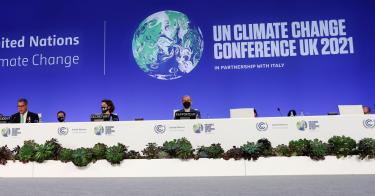European leaders may well be victims of their own success. Having incessantly drawn the world’s attention to the problem of climate change, the world is increasingly skeptical that European leaders have the right answers to address the challenge efficaciously.
COP26, the international climate conference recently hosted by the United Kingdom in partnership with Italy, only reinforced that skepticism. In addition to demonstrating no capacity to influence China, the world’s worst polluter, the Europeans failed to pursue a constructive agenda, ignoring issues like energy security, innovation, and pro-growth policies.
One reason even many Europeans are unconvinced about the seriousness of COP26 and similar “climate summits” is that they seem more dedicated to cheerleading, speechmaking, virtue signaling and hanging-out than coming to grips with serious geopolitical issues. The carbon-footprint of COP26 was twice the size of the last conference, hardly a symbol of serious commitment.
The format itself is more like a rock concert than a conference, with an excessive number of countries in the mosh pit, each pursuing divergent and competing interests. Even many climate activists soured on the effort. “It is not a secret that COP26 is a failure,” declared Greta Thunberg, high priestess of climate alarmism.
>>> Were Biden’s Claims at COP26 Climate Change Summit Accurate?
Despite the globalist rhetoric, national interests carried the day at COP26 summit. China, for instance, successfully lobbied to weaken the pledge to end the use of coal. Even the Europeans flinched. Germany and Italy recoiled from a commitment to sell only zero-emissions cars by 2040.
While the conference was organized for failure, European leaders also used the occasion to continue politicizing climate policy. Radical calls for massive economic “transformation” crowded out space for tackling environmental problems in a pragmatic way. What European elites and everyday Europeans mean by “sustainable” solutions is becoming increasingly divergent.
Europeans, of course, believe it is right and proper to safeguard our planet. But most realize this goal cannot be achieved at the expense of people’s freedom and economic well-being. Indeed, there are already examples where politicized environmental measures have created negative social impacts: the yellow vests protests in France are just one example.
Radical environmental policies have fractured a broader consensus. Two major side conferences in Glasgow featured conservative dialogue, discussing alternative ways to mitigate the impact of climate change and sustain real economic growth. These discussions focused almost exclusively on free market alternatives. The fact these kinds of voices are cropping up around the epicenter of the climate conclave reflect the growing discontent with the progressive orthodoxy.
Europeans also see for themselves that the geo-politics of COP26 are just not working. Beijing uses the environmental issue only to pursue and protect its own interests, and the COP26 summit was no exception. Despite past assurances of his desire to fight climate change, Chinese President Xi Jinping didn’t bother to attend the conference.
His lower-level representatives did not sign onto some of the most important deals that were struck during the conference. In particular, Beijing refused to sign an agreement, proposed by the United States and the European Union, to reduce methane emissions by 30 percent by 2030. Instead, it merely promised to develop a national plan on methane. Beijing also continued to maintain its usual ambiguous stance on carbon neutrality. Clearly, Beijing continues to use the climate issue to protect its national interest and gain a competitive advantage over its adversaries (starting with the United States and Europe).
China is not alone. Putin did not attend either. His policies are a direct challenge to COP26. He is more interested in energy as geopolitical weapon than in bettering the global environment.
>>> Climate Change Is Best Countered by Economic Freedom
Europeans are further troubled by the lack of real leadership from Washington. How Biden is dealing with Beijing is one example. The US-China Joint Glasgow Declaration is a verbose and generic document which does not really bind China to concrete commitments.
The biggest geopolitical problem of “climate détente” with China may be John Kerry. It is no secret that the US Special Envoy for Climate has fundamentally put climate cooperation before the human rights issue. A relaunch of cooperation with Xi’s regime could therefore be a problem for the international credibility of the United States.
The greatest mistake European leaders could take from COP26 and their self-congratulatory press releases is to think that they walked away from Glasgow with momentum on their side. The opposite is true. The far-left is unhappier than ever. China and Russia are playing them for a fool. The U.S. isn’t helping.
Many Europeans are waking up to realize that the COP26 agenda is just wrong. A far more productive and realistic approach would be to expand free-market solutions at home and abroad while protecting European energy security against the real threats posed by China and Russia. What Europe really needs is pro-growth, low-tax policies that would empower being a better steward of the environment.
This piece originally appeared in 19fortyfive




